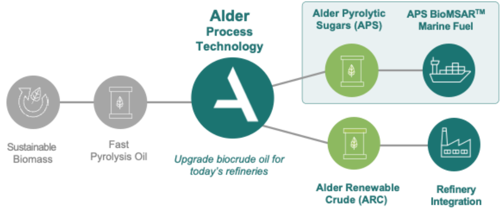Alder Process Technology uses APS to produce low-carbon marine fuels
Alder Process Technology has provided recent progress on its efforts to accelerate decarbonization of the marine fuel sector using Alder Pyrolytic Sugars (APS). APS is created using our proprietary biocrude oil fractionation technology, which converts fast pyrolysis oil derived from sustainably sourced biomass into two products: the pyrolytic sugar fraction, resulting in APS, and the pyrolytic lignin fraction, resulting in Alder Renewable Crude (ARC).
Nearly all of the biogenic carbon is efficiently processed into these two product streams during our proprietary process. This efficiency enables both products to be utilized for low-carbon intensity fuels and chemicals – APS as a marine fuel blendstock, and ARC for refining into sustainable aviation fuel, ground transportation fuel, and chemicals.

Non-food, lignocellulosic bio-blendstocks, like APS, are critical as the marine fuel sector faces mounting technical and regulatory challenges in meeting the International Maritime Organization’s decarbonization targets, including the goal of achieving net-zero emissions by 2050. Decarbonizing this sector is particularly complex due to the energy density requirements of long-haul shipping and the limited availability of drop-in, low-carbon fuel alternatives compatible with existing engine and bunkering infrastructure.
In partnership with British company Quadrise initial lab testing has been successfully completed at the Quadrise Research Facility to incorporate APS into their bioMSAR™ marine fuel. This cutting-edge fuel is a proprietary emulsified blend of fossil and biofuel components from Quadrise that together comprise a low-carbon alternative. The test results confirm the emulsion stability of APS in bioMSARTM and demonstrate promising marine fuel properties. Under our newly signed Joint Development Agreement, the Quadrise and Alder Renewables team will collaborate to conduct small-scale diesel engine tests later this year. Subject to the success of these tests — and with the agreement of both parties — third-party testing in marine diesel engines would then be completed within twelve months.
This recent demonstration with APS BioMSARTM highlights the potential to address the significant decarbonization challenges facing the global logistics and maritime sector. By deploying non-food, lignocellulosic-derived bioblendstock with favorable physicochemical properties, we can transition — at speed and scale.
We believe this evolution represents a key step towards delivering a technically viable and commercially significant pathway for decarbonizing marine fuels using the Alder Renewables technology package. The combined applications of APS and ARC for decarbonizing transportation fuels drive overall value for the Alder Process Technology solution.






Comments